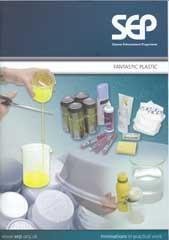Trevor Critchley reviews this guide to polymer chemistry
Fantastic plastic
Averil Macdonald
London: Gatsby SEP 2008 | Pp55 | £6.00 | ISBN 978 1 901351 77 4
Reviewed by Trevor Critchley

This year marks the centenary of the world's first synthetic polymer, Bakelite. Fantastic plastic, an addition to the Science Enhancement Programme's (SEP) Innovations in practical work series, is testimony to just how far polymer chemistry has come in the past century.
This 58-page guide will enable teachers to bring their teaching of polymer chemistry up to date, and provide Key Stage 4 students with stimulating and relevant practical work. The booklet offers eight short lesson ideas and two extension activities, all intended for use at KS4. Apart from two demonstrations, most of the activities are designed as safe, hands-on experiences for students. Kit requirements are fairly minimal, though schools may need to buy in some supplies such as rubber latex solution, hydrogel and polyox. These are available from Middlesex University Teaching Resources (MUTR), which also offers kits to demonstrate the applications of various smart polymers.
Following a brief introduction, the practical work is laid out as a series of photocopiable worksheets with accompanying technician's and teacher's notes. The booklet ends with an excellent background science chapter, which contains enough clearly explained information to update teachers on the latest developments in polymer technology. Although not immensely detailed, this section should prove useful, particularly for non-specialist teachers, and anyone who is likely to be asked those tricky 'But how?' questions.
The Science Enhancement Programme is part of the Gatsby Charitable Foundation. Teachers and technicians can register free with the SEP website, which provides access to a wide range of free publications and resources - including this one. Related worksheets, diagrams and technical notes are all available to download in electronic form, which makes the resource even more versatile.
Fantastic plastic and other SEP materials give teachers and students a taste of cutting-edge science, which is both relevant to the curriculum and stimulating at the same time. I recommend any teacher who has not yet discovered SEP to register right away.
Related Links
A professional organization devoted to supporting philosophy inspired by continental European traditions.






No comments yet